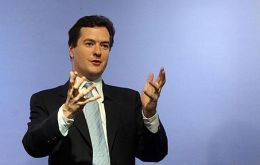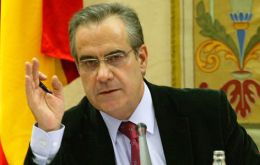MercoPress. South Atlantic News Agency
Economy
-
Thursday, June 24th 2010 - 06:07 UTC
G-20 summit: EU wants timetable to scrap stimuli; US warns recovery is still weak

The European Union (EU) has urged the G20 club of nations to agree when to scrap their economic support packages. The EU said a coordinated exit from stimulus measures would help restore confidence and reduce the risk that some countries would be disadvantaged.
-
Thursday, June 24th 2010 - 06:02 UTC
US Central bank anticipates low rates for an “extended period”

Two days ahead of the Toronto G-20 summit the US Federal Reserve anticipates it will keep its main interest rate at a near zero level, for an “extended period”. The Federal Open Market Committee said on Wednesday that “subdued inflation” and other factors “are likely to warrant” keeping rates at their historic lows.
-
Thursday, June 24th 2010 - 05:48 UTC
Brazil forecasts a drop in direct foreign investment because of European crisis

While the Brazilian economy is moving ahead at “Chinese rates” the Central Bank reduced its estimate of direct foreign investment this year from 45 to 38 billion US dollars because of the European crisis.
-
Thursday, June 24th 2010 - 05:35 UTC
China’s constructive role in global economic and financial affairs
By Dr. Ye Yu, Assistant Director of the Institute for Comparative Studies affiliated to the Shanghai Institute for International Studies (Special for People's Daily Online).The Group of Twenty (G-20) Summit (*) has opened a new page in the management of global economy and financial system, and China has played an important positive and constructive role since the First G20 Summit was held in Washington D.C. in November 2008.
-
Thursday, June 24th 2010 - 04:00 UTC
Strong austerity measures anticipate Spain will slip back into recession

The Spanish economy will slip back into recession in the second half of the year, a foundation supported by the country’s savings banks said in a publication released Wednesday.
-
Thursday, June 24th 2010 - 02:27 UTC
Soros warns that Germany’s policies threaten the Euro and European Union

Germany's budget savings policy risks destroying the European project and a collapse of the Euro cannot be ruled out, billionaire investor George Soros said in a newspaper interview.
-
Thursday, June 24th 2010 - 02:08 UTC
Mercosur “too small” for Brazil, claims Sao Paulo federation of industries

One of Brazil’s most influential lobbies, the Sao Paulo Federation of Industries, FIESP, claims that Mercosur is an economic space “too small” given the development and “growing international presence of Brazil”.
-
Wednesday, June 23rd 2010 - 04:09 UTC
UK, France and Germany slap coordinated levy on banks

Banks operating in the UK will be hit with a levy in a move set to raise more than £8bn over four years, the chancellor has announced -The levy is part of a joint move between the UK, France and Germany.
-
Wednesday, June 23rd 2010 - 03:55 UTC
Argentina’s debt-swap acceptance expected to reach 70%

The latest available information on the Argentine debt-swap reported a higher acceptance rate than was anticipated by market analysts reaching 68.3%, which is above the self imposed 60% floor by Argentine authorities. The news was released by Buenos Aires financial daily Ambito Financiero.
-
Wednesday, June 23rd 2010 - 03:52 UTC
Spanish Socialists approve labour reforms; conservatives abstain

Spanish lawmakers Tuesday gave preliminary approval to labour reforms considered essential for slashing the soaring jobless rate, reviving the fragile economy and sending a strong message to nervous markets.
